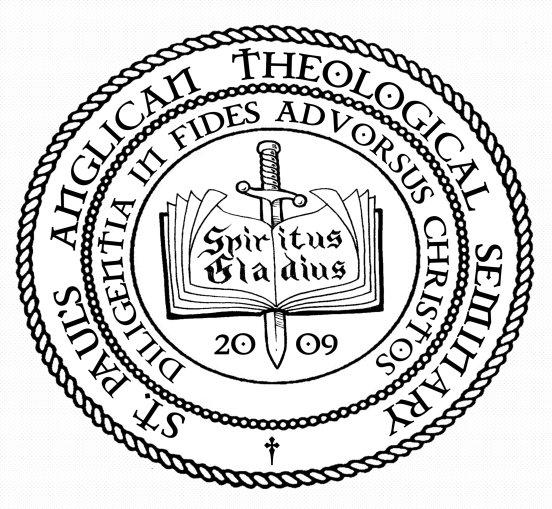
PROGRAM OUTLINE
At this time St. Paul's Anglican Theological Seminary only offers one course of study which is specifically designed to prepare postulants for Holy Orders. To earn the M.A. in Anglican Ministry, you will have to complete 76 Semester Hours through the following courses. After you have successfully completed all courses, you will be mailed your degree and a set of transcripts showing the work you have completed. You must go to the "Enroll" page and get registered before starting any of the courses. This course was designed to be a three year program but can be completed at the students own pace. For those who are not seeking priesthood but aspire to the deaconate, contact us and we can prescribe a less intensive course of study based on this one.
Year One:
ANGS-101 Importance of Bible Study
ANGS-102 Introduction to the Bible
ANGS-103 Old Testament Survey
ANGS-104 Books of the Apocrypha
ANGS-105 New Testament Survey
ANGS-106 Church History I
ANGS-108 Explanation and Guide to Anglicanism
ANGS-109 The Church, Its Nature, Structure, and Function
ANGS-112 The Liturgical Calendar
ANGS-113 The Daily Office
ANGS-114 Anglican Theology I
ANGS-122 Book of Common Prayer
Year Two:
ANGS-107 Church History II
ANGS-111 Anglican Vestments
ANGS-115 Anglican Theology II
ANGS-117 Creedal Theology I
ANGS-120 Moral Theology
ANGS-123 Knowing God Through the Liturgy
ANGS-126 Altar Training *
(*ANGS-126 requires that students receive training in person with a local ACW Priest, a mentor appointed by the Bishop for this purpose, or by means of video correspondence. A written description with accompanying photos of the postulant performing each segment of Altar Training may also be acceptable. )
ANGS-127 Hermeneutics Pt. I Interpreting Scripture
ANGS-130 Introduction to Homiletics
ANGS-133 Helping Young People Apply the Bible
ANGS-134 Practical Ministry I The Priest Like Task
ANGS-136 Personal Evangelism
Year Three:
ANGS-110 The Episcopal Church, Its Message for Men of Today
ANGS-116 Anglican Theology III
ANGS-118 Creedal Theology II
ANGS-119 Sacramental Theology
ANGS-121 Pastoral Theology
ANGS-124 Proclaiming God Through the Liturgy
ANGS-125 Service of Holy Communion*
(*ANGS-125 requires that students receive training in person with a local ACW Priest, a mentor appointed by the Bishop for this purpose, or by means of video correspondence. A written description with accompanying photos of the postulant performing each segment of Holy Communion may also be acceptable.)
ANGS-128 Hermeneutics Pt. II How to Interpret the Bible
ANGS-129 Hermeneutics Pt. III How to Study the Bible
ANGS-131 How to Preach and Teach the Bible
ANGS-132 Ways of Communicating the Bible
ANGS-135 Practical Ministry II Christian Ministry in Contemporary Society
Upon Successful Completion of the Three year Course,
the Student is required to write and submit their Master’s Thesis according to
the specifications outlined below.
1. The subject of the Thesis must be submitted to and approved by SPATS. The Thesis must be an original document, consisting of 17,000 to 18,000 words, and cannot be a previously written document (paper, thesis), nor any part of any previously written document (paper, thesis).
2. Once the subject has been approved by SPATS, then the student must submit the Thesis in the following form:
- The Thesis must be typed and double spaced. The subject title, the author's name and page number must appear in the upper right hand corner of each page (except for the title page).
- The "title page" must have the subject title and the author's name centered in the middle of the page, with the name of St. Paul's Anglican Theological Seminary and the instructor/mentor's name centered near the bottom of the title page.
- The pages of the Thesis should follow this order:
2) Table of Contents
3) Thesis (by chapter)
4) End notes
3. The Thesis is to be submitted along with a signed letter of authenticity (provided by SPATS), which states that the Thesis is in fact your own original work formulated and completed by you (the student) to SPATS for examination.
St. Paul’s Anglican Theological Seminary is not accredited nor does it seek
accreditation by any agency that is affiliated with or endorsed by the U.S.
Department of Education (DOE).
We need no secular accreditation because we offer ONLY religious studies leading only to religious oriented degrees, diplomas and certificates. We offer NO secular vocational training, certificates, degrees or diplomas.
About Accreditation
Accreditation in the USA is purely a voluntary process.
Accreditation is NOT required in the USA.
Accreditation is NOT a function of the United States government.
Accreditation is recognition of a
school by an organization set up to establish guidelines for colleges and other
schools. There are government accrediting agencies (associated with the U.S.
Department of Education - DOE), and private agencies, associations,
commissions, councils and unions which are NOT associated in any manner with
the U.S. Department of Education (DOE). Religious schools, such as St. Paul’s
Anglican Theological Seminary need no secular accreditation because
no secular studies are offered.
Many religious schools choose not to be accredited at all. The majority of bible colleges, bible institutes, preacher schools and theological seminaries do not accept or seek government endorsement (accreditation) at any level in order to maintain their strict separation of church and state. Historically, governments at all levels continually exert pressure to control all educational institutions. Too often the government made rules and regulations are contrary to the teaching of the Holy Bible.
Credits for Non-Accredited Religious Schools are Widely Accepted
Credits earned by students through non-accredited religious schools are widely accepted by churches, bible colleges, mission boards and secular employers as college-level work.
THE SEAL OF OUR SEMINARY
